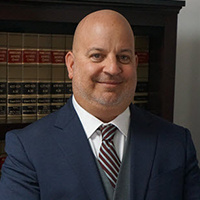 Montgomeryville Criminal Lawyers, Pennsylvania
Montgomeryville Criminal Lawyers, Pennsylvania
Sponsored Law Firm
-
 x
x

Click For More Info:
-
The McGarrigle Law Firm
1500 Walnut Street, 22nd Floor Philadelphia, PA 19102» view mapWhite Collar Crime, Criminal Appeals, DUI&DWI Trial Experience & Zealous Advocacy
The Firm’s devoted attention to your individual concerns, our vast trial experience in all types of criminal matters, and our skillful advocacy will ensure that your rights are protected.
800-934-5330
Sponsored Lawyers
1-10 of 14 matches
Accident & Injury, Criminal, DUI-DWI, Car Accident, Wrongful Death
Steven F. Fairlie has been designated a Pennsylvania “SuperLawyer” in both Personal Injury and Criminal Defense and placed on their lists of the Top 100 Lawyers in Pennsylvania for more than a decade straight, The National Trial Lawyers Top 100 Trial Lawyers, Top Rated Attorneys in Pennsylvania as published in The Wall Street Journal, Philadelphia Inquirer, and the The Legal Intelligencer, The National Advocacy for DUI Defense Top 100 Driving Under the Influence (DUI) Attorneys, and is a holder of Martindale-Hubbell’s prestigious “AV” rating and Client Distinction Award, designating preeminent lawyers based upon legal ability, ethics, and client satisfaction. He has been rated a perfect 10.0/10.0 on AVVO.COM and is one of a just 35 attorneys in Pennsylvania to be named a “Lawyer on the Fast Track” by The Legal Intelligencer in 2006. He has been named a Fellow of the Litigation Counsel of America (awarded to less than one-half percent of judges, lawyers, and scholars in America), received the National Academy of Criminal Defense Attorneys Top 10 Attorney Award, and been named a Top 100 Criminal Defense Lawyer by the American Society of Legal Advocates. He has won many other awards for his trial work that are simply too numerous to list here. He has successfully handled numerous civil (slip and fall, auto accidents, land development litigation, etc.) and criminal trials (narcotics, DUI, capital murder, robbery, rape, etc.). Prior to private practice, he worked on the Narcotics Team and the Major Crimes Team of the Montgomery County District Attorney’s Office from 1996 to 2000. He successfully argued for the death penalty in 1999 and was lead prosecutor in a case involving $55 million of cocaine. Subsequently, as a defense attorney, he took the appeal of a client sentenced to death and convinced the prosecutor to vacate the death sentence. He used forensic tire print evidence to prove another client not guilty of attempted murder. In yet another case he uncovered evidence which reduced the offer on a robbery case from 25–50 years down to 2 years probation. He represented one individual charged with 3 separate charges of DUI and had the first case dismissed at the Preliminary Hearing, the second accepted into the A.R.D. program, and the third case dismissed after a trial judge granted suppression of all evidence in the case. Mr. Fairlie has obtained not-guilty verdicts in major jury trials involving shootings, burglaries, rape, etc. despite positive eyewitness identifications of his clients. On appeal, he has successfully argued for reversal of a death sentence in one case and a sentence of 70 years in another case. Recent successful plea negotiations include 2 1/2 to 5 years in the case of a man who struck his wife in the head with a hammer and strangled her and 6 to 12 years in a First Degree Murder case. Mr. Fairlie went to trial on a case involving more than $50 million of land transactions and settled the case in the second week of trial. He has obtained six-figure settlements in numerous personal injury cases, including car accident, back injury, and dog bite cases. Mr. Fairlie often serves as a speaker or course planner for various organizations such as the Pennsylvania Bar Institute’s Annual (2007–2025) Criminal Law Symposium in Harrisburg, Pennsylvania, the Pennsylvania Association of Criminal Defense Lawyers, the Montgomery and Bucks County Bar Associations, and various law enforcement training programs. He also teaches numerous other continuing legal education seminars for lawyers every year. He earned his B.A. in Government and Law from Lafayette College in 1991 and his J.D. from The Dickinson School of Law in 1995 where he was a member of the Appellate Moot Court Board, the Environmental Law Journal, and a Chairman of the Student Bar Association. He has been Co-Chairman or Chairman of the Montgomery County Bar Association’s Criminal Defense Committee since 2001, a member of the Montgomery County Bar Association’s Judiciary Committe and Trial Lawyers’ Section, a member of the Pennsylvania Bar Association’s Professionalism Committee and Civil Litigation Section, a member of the Pennsylvania Association of Criminal Defense Lawyers Hotline Panel of Experts Committee, a member of the Montgomery County Sexual Assault Task Force, a member of The National Association of Criminal Defense Lawyers and an Associate Member of the Philadelphia Bar Association. Mr. Fairlie’s areas of practice include personal injury, car accidents, criminal defense, and DUI defense. Mr. Fairlie enjoys scuba-diving, hunting, fishing and coaching youth sports.
(more)Accident & Injury, Criminal, Estate
Following law school Mr. Margiotti practiced exclusively in the area of personal injury and accident law with a major Philadelphia law firm. After several years he then moved to Spring House, Montgomery County, and began his own solo practice focusing upon personal injury and accident cases, as well as DUI defense. Mr. Margiotti then entered a partnership during the 2000's based in Montgomeryville, Pennsylvania, focusing again in the areas of personal injury and accidents, as well as DUI defense. In 2010 Mr. Margiotti closed his Montgomeryville office and founded McMenamin & Margiotti, along with Mr. McMenamin. Mr. Margiotti is Nationally Certified by the National Highway Traffic Administration in field sobirety testing. He was the recipient of the National Italian American Scholarship for Scholastic Achievement in law school.
(more)Divorce & Family Law, Landlord-Tenant, DUI-DWI, Estate, Wills & Probate
Liam J. Duffy practices in the areas of Divorce, Support, Child Custody, Equitable Distribution, Protection from Abuse, Civil Litigation, Business Law and Landlord-Tenant Law. He is admitted to practice in Pennsylvania, New Jersey, and the Eastern District of Pennsylvania. Liam is a member of the Pennsylvania Bar Association, Montgomery County Bar Association, and Bucks County Bar Association. For 2017, 2018, and 2019, Liam was awarded the SuperLawyers Rising Star Designation, which is reserved for 2.5% of eligible attorneys in Pennsylvania. He was also awarded the 2019 Top 10 under 40 Award. Liam prides himself on being a pragmatic and compassionate attorney but also one who will aggressively protect his client's interests and litigate more complex cases. Liam volunteers as an MCAP pro bono attorney for children in Montgomery County and as a pro bono attorney for the Women's Center of Montgomery County. Liam has acted as a Divorce and Financial Planning subject matter expert for the American College in Bryn Mawr. Prior to becoming an attorney, Liam focused his education and career on business and corporate finance. He attended the University of Delaware for his Bachelor’s degree, Saint Joseph’s University for his Master’s degree in Finance, and Rutgers for his law degree, where he graduated in the top 10% of his class. After business school, Liam worked for six years in corporate finance and earned various financial designations. Despite having a promising and lucrative career in finance, he decided to pursue a career in law where he could help people and spend time in the courtroom. In his free time, Liam enjoys coaching his children’s sports teams, exercising at a local gym, and spending time with his family.
(more)



 Daniel McGarrigle Philadelphia, PA
Daniel McGarrigle Philadelphia, PA TestimonialsRecent Reviews
TestimonialsRecent Reviews Contact UsCall or Email
Contact UsCall or Email



